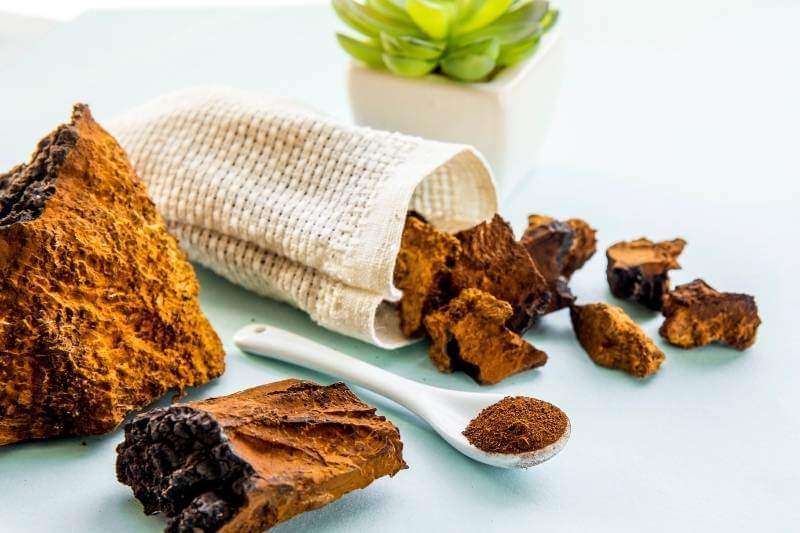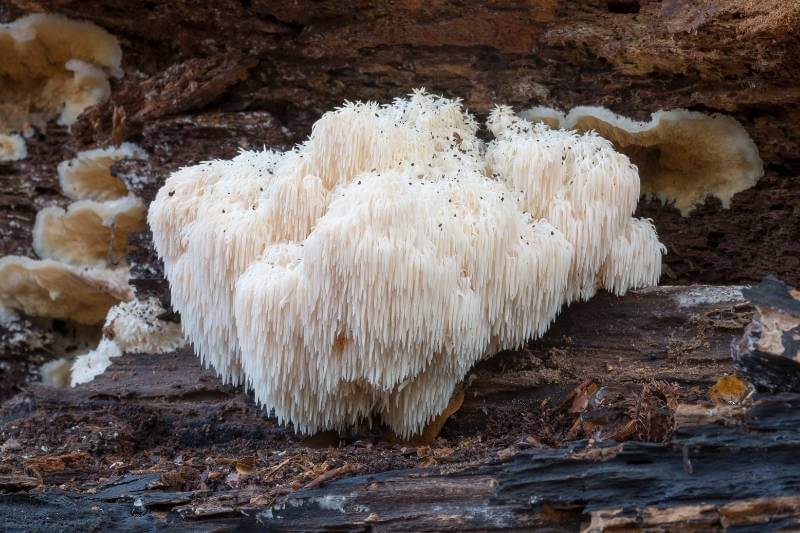In this Four Sigmatic mushroom coffee review, I look into the product ingredients, scientific research, potential benefits, side effects and precautions, marketing claims, pricing, and then provide my recommendation.
I was quite intrigued by the idea of a coffee and medicinal mushroom product but, when I Googled it, I was surprised to find the top results filled with affiliate advertorials slanted to convince you to buy the product rather than just giving objective stand-alone information.
To be clear, this review is neither for or against Four Sigmatic. It’s purpose is to simply help you sift through the marketing and make your own informed and educated decision about whether or not you want to try the product.
Therefore, the aim here is to provide a fair, honest, and independent review without any undue influence from affiliate links.
Disclaimer: No conflicts of interest. This review is 100% independent and has no affiliate links. Ads that may appear on this page are autogenerated based on your individual search and browsing habits and I do NOT have direct granular control over them. Any revenue generated from ads offsets website costs which keep these articles free, unbiased, and independent for you to read.
- What is Four Sigmatic?
- Four Sigmatic ingredients
- Research limitations
- Safety & side effects
- Non-mushroom ingredients
- Marketing claims
- Does Four Sigmatic really work?
- How much caffeine does Four Sigmatic mushroom coffee contain?
- Is Four Sigmatic mushroom blend safe?
- Is Four Sigmatic keto friendly?
- Vegan friendly and gluten free?
- What’s with the Four Sigmatic lead warning?
- Price
- Take home message
What is Four Sigmatic?
Four Sigmatic sells a variety of mushroom coffee products on its website with claims that they can help you think more clearly, perform better, relax, or strengthen your immune system.
Sounds great, but is it just fancy marketing or is there any research to back up these claims?
Interestingly, medicinal mushrooms such as reishi, chaga, lion’s mane, turkey tail, and cordyceps do have a rather significant body of research demonstrating a variety of physiological effects. However, the majority of the research was conducted on animals or in test tubes or Petri dishes as opposed to humans.
Despite these limitations, it is still a very interesting emerging area of nutrition science with a lot of opportunity to explore the potential health benefits of medicinal mushrooms.
Four Sigmatic ingredients
Four Sigmatic offers a variety of different mushroom coffee mixes with different characteristics and purported benefits.
In the following section, I give a short research rundown on each of the mushroom ingredients found in the Four Sigmatic products.

Chaga (Inonotus obliquus)
Chaga, also known by its scientific name Inonotus obliquus, is a parasitic fungus that has been used as a traditional folk medicine in Northern Europe and Russia for its effects on immunity and general health.
Possible benefits
Studies have shown that chaga may have a variety of beneficial physiological effects, including:
- Anti-viral properties against hepatitis C and a variety of cat viruses;
- Anti-bacterial effects against Toxoplasma gondii and a reduction in inflammatory markers in mice.
- Anti-allergic effects in mice via stabilisation of mast cell activity;
- Anti-cancer effects including inhibition of tumor growth and metastasis, restoration of compromised immunity, protection of the gastrointestinal tract against chemotherapy, and an enhancement in effectiveness of chemotherapy.
- Improved insulin sensitivity and reduced body fat, as well as favourable changes in body weight and fasting blood glucose levels in diabetic mice.

Lion’s mane (Hericium erinaceus)
Lion’s mane, also known by its scientific name Hericium erinaceus, is an edible mushroom found in North America, Europe, and Asia that grows primarily on dead hardwood trees like beech and maple.
Possible benefits
A number of studies have shown that lion’s mane may have a variety of beneficial physiological effects, including:
- Reducing depression and anxiety in mice mediated via anti-inflammatory compounds or hippocampus neurogenesis or hippocampal neurotransmission;
- Improvement of cardiovascular disease risk factors by lowering triglycerides, reducing LDL cholesterol oxidation, and reducing blood clotting;
- Lowering blood sugar in diabetic mice, reducing alpha-glucosidase activity (reduces carb breakdown and consequently blood sugar); reducing diabetic neuropathy pain;
- Fighting liver and breast cancer, leukaemia, colon, and stomach cancer;
- Protecting against Alzheimer’s disease, and improving cognitive function via neurogenesis in mice and in older adult humans;
- Protecting against stomach ulcers and inhibition of H. pylori growth (implicated in ulcer development).

Reishi
Reishi, also known by its scientific name Ganoderma lucidum, is an edible mushroom found in hot and humid regions of Asia.
Possible benefits
A number of studies have shown that reishi may have a variety of beneficial physiological effects:
- May boost the immune system and increase white blood cells in people with colorectal cancer.
- Possible anti-cancer effects. Reishi impeded cancer cell proliferation in test tube studies and boosted immunity in patients with advanced colorectal cancer, and suppressed the development of colorectal pre-cancerous lesions, and reduced fatigue, improved quality of life, and lowered anxiety and depression in breast cancer survivors.
- Reduction of fatigue and neurasthenia symptoms in a randomised double-blind placebo controlled study of 132 neurasthenia patients.
- Possible cardioprotective benefits. Reishi lowered triglycerides and increased protective HDL cholesterol in people with high blood pressure and dyslipidemia (abnormal blood fats), but a separate study in healthy adults found that reishi had no effect compared to those taking a placebo.
- Shown to lower blood sugar in animal and human studies. However, a Cochrane Review of randomised controlled trials concluded that there is not enough high quality evidence supporting reishi’s role in improving biomarkers in people with type 2 diabetes.

Cordyceps
Cordyceps is a parasitic fungus that grows on insect larvae. The fungus attacks the host and consumes and grows out of the husk of the larvae.
Possible benefits
A number of studies have shown that cordyceps may have a variety of beneficial physiological effects:
- Immunomodulation: Studies on human cells in a test tube found that cordyceps could suppress the inflammatory markers (Kuo et al, Kim et al, Weng et al, Park et al).
- May be cardioprotective: Rodent studies demonstrated that cordyceps can lower low density cholesterol (LDL), very low density cholesterol (VLDL), triglycerides, and cholesterol ratios (Gao et al, Guo et al, Koh et al).
- May help manage diabetes: Rodent studies have shown that cordyceps can help improve blood sugar control and insulin signalling.
- May slow tumour growth: Rodent studies showed that a cordyceps extract can slow or decrease tumor growth and improve lifespan of mice with tumors.
- Anti-aging effects: Cordyceps extracts have been shown to scavenge free radicals and protect mitochondria which may counteract the effects of ageing.

Turkey tail mushrooms
Turkey tail mushrooms, also known by its scientific name Trametes versicolor, Coriolus versicolor, and Polyporus versicolor, is an edible mushroom that grows on logs and stumps of deciduous tress primarily in North America.
Possible benefits
A number of studies on turkey tail mushrooms show it may exert a number of beneficial physiological effects:
- Turkey tail contains a variety of potent antioxidants such as flavonoids and phenols which may help reduce oxidative stress and inflammation.
- May boost immunity: Turkey tail polysaccharopeptides krestin (PSK) and polysaccharide peptide (PSP) are two types of polysaccharopeptides found in turkey tails. PSP has been shown to stimulate monocyte/macrophage function which may be an effective therapeutic intervention in targeting tumors. PSK may activate macrophages that help protect your body from pathogens.
- May suppress cancer cell proliferation: In a test tube study, PSK was shown to suppress cancer growth factors and support inhibitors of cancer growth factors in human colon cancer cells.
- May enhance cancer treatment: A comprehensive meta-analysis of studies found that turkey tail may offer additional survival benefits over cancer treatment alone, particularly in people with breast, gastric, and colorectal cancer.
- May enhance gut health: In an eight-week study of 24 healthy people randomised to receive PSP, amoxicillin antibiotic, or no treatment (control), PSP was shown to favourably improve the microbiome (gut bacteria).
Research limitations
Research on medicinal mushrooms offers hope for new treatment options for a variety of health conditions or even just for maintaining good health. However, because this is a new area of research, a number of limitations preclude us from making definitive health claims at this time.
Limited human research
The most important observation is that the majority of research on medicinal mushrooms has been carried out in animal or test tube studies, as compared to relatively few on humans.
While this does not invalidate the research, human physiology can vary from other animals and the effects observed in animal and test tube or Petri dish studies may or may not be the same in free living adults.
Isolated vs whole mushroom
Many of the studies to date did not test the effects of the whole mushroom but instead used isolated and/or concentrated compounds or extracts which could exert a different physiological effect than the whole mushroom fruit.
This is an important point to remember when it comes to mushroom products. You can’t always expect that what’s in the product will yield the exact same results as in studies that used highly concentrated mushroom compounds.
Dosage
We do not yet know the effective dosage in humans for each medicinal mushroom. There was a great deal of variability in extraction methods and dosages employed on animals or on isolated cell cultures.
If a product uses a small amount of whole mushroom, then the proportion of active constituents with health-promoting benefits may be smaller than what was found in a research study (i.e., using higher doses of isolated extracts to elicit specific results).
Type of preparation
It is not yet known if medicinal mushroom compounds will exert the exact same effects when brewed as a tea (or coffee, as in the case of Four Sigmatic) as compared to when eaten whole or when isolated and concentrated. Moreover, bioactive peptides (short protein units) that may be heat sensitive could be denatured by heat and may no longer exert the same physiological effects.
Future research
Controlled studies on free-living humans of different age groups, genders, and health status would greatly enhance our understanding of chaga’s potential benefits.
Safety & side effects
Medicinal mushrooms are generally considered safe, but it’s important to remember that we really do not yet have a complete and clear understanding of all the potential side effects or interactions of all medicinal mushrooms.
As mentioned above, animal and test tube studies offer a basic idea of the potential physiological effects which may (or may not) occur in humans.
Some of the effects, if the same in humans, could pose a health risk in some at-risk people.
Potentiation of medications
The physiological mechanisms behind the effects of medicinal mushrooms could theoretically interact with prescription medications in some people and put them at greater risk for harm.
For example, chaga, cordyceps, reishi, and lion’s mane have been shown in animal studies to reduce blood glucose levels. If this effect is similar in humans, then it could potentiate the blood sugar-lowering effect of insulin and/or oral hypoglycaemic medications and possibly lead to hypoglycaemia in some individuals.
For people with bleeding disorders or those taking blood thinning medications, chaga could potentially potentiate this effect and promote bleeding.
However, on a positive note, if equally effective, these effects also open the door for medical professionals to explore medicinal mushrooms as an alternative to pharmaceutical interventions.
Autoimmune disease risks
Medicinal mushrooms have been shown to potentiate factors involved in the immune response. While this might be a desirable effect for some, if you have an autoimmune disorder (i.e. multiple sclerosis, lupus, rheumatoid arthritis), then taking mushrooms could plausibly increase/worsen your symptoms.
Pregnancy
The effects of medicinal mushrooms on pregnant women is unknown. While there may be beneficial effects, we do not yet have any understanding whatsoever of any potential adverse effects. So if you’re pregnant, it may be in your best interest to hold off until after giving birth.
Unregulated
It’s important to remember that medicinal mushrooms still fall under the banner of dietary supplements. Because supplements are unregulated (see the 1994 Dietary Supplement Health and Education Act (DSHEA), products can be marketed and sold to consumers without having to be proven safe, effective, pure, or that the potency on the label is what’s in the product.
In defence of Four Sigmatic, the company does appear to put safety as a high priority, but I would strongly urge caution when buying random mushroom products from random vendors on Amazon or E-Bay.
Natural contaminants
There have been concerns raised about arsenic levels found in cordyceps. A risk assessment study carried out by researchers in Beijing found that arsenic in cordyceps sinensis poses a potential health risk. However, it is not known if this is a widespread issue or if it’s isolated to wild cordyceps sinensis, nor the extent to which this may affect commercially available medicinal mushroom products.
Mushroom species variability
It’s important to understand that there are different sub-classes of mushrooms which may have different physiological effects in the body.
For example, there are many different types of cordyceps fungi and they’re not all identical.
Researchers in Beijing have highlighted the lack of a defined classification system for medicinal cordyceps fungi as a source of confusion in the industry and the public, and even among pharmaceutical scientists. They also raised concerns regarding quality control in the cordyceps industry.
Clarification
To be absolutely clear, this is NOT to say there are any questionable practices by Four Sigmatic. Quite the contrary, as medicinal mushrooms grow in popularity, there will be more vendors (of varying levels of ethics/morals) entering the market and it’s important to buy from reputable sources that observe good manufacturing practices.
Non-mushroom ingredients
While medicinal mushrooms are the marquee ingredients in Four Sigmatic coffee, there are a number of other non-mushroom ingredients in the products (coffee beans, L-theanine, probiotics, MCT oil, ashwaganda, eleuthero, and tulsi) which may also have an effect (i.e., caffeine may make you feel peppy and alert). So this might make it difficult for you to know if the effects you experienced were from the mushrooms or other ingredients.
Marketing claims
Four Sigmatic does a good job of keeping their within bounds and does not resort to extravagant over-the-top claims like I highlighted in my article 37 Bullshit Marketing Claims You Should Ignore.
Here’s a short list of some of the marketing claims from the website.
- For focus and steady energy
- For a chill body and mind
- Gives you a boost of energy
- Supports everyday stress
- Fuels your body and mind
- Supportive lift to your morning routine
As you read each of these, you can see that each claim is subtle and vague, so it’s up to you as the consumer to decide what it means to you.
Does Four Sigmatic really work?
The eye of the beholder
Whether Four Sigmatic “works” or not really depends on your own personal expectations and how you interpret the marketing claims.
For example, “fuels your body and mind” can mean different things to different people and there are a lot of factors in our lives that can affect how we feel on a day to day basis.
If you’re looking for a morning pick-me-up, the products that contains caffeine and will certainly make you feel more alert but, with multiple product ingredients, it’s hard to know what ingredients are attributable to what effects.
Research vs real world
There is a lot of interesting research on medicinal mushrooms but much of it is still in its early stages. Animal and test tube studies give us a look at their potential for reducing cancer risk and boosting immunity, but we don’t have any conclusive evidence that products which contain small amounts of the powdered version of whole mushrooms will exert the same effect in the body as, say, isolated polysaccharopeptides.
Superfood vs super marketing
It’s also important to beware of the superfood fallacy. While marketing in general can overhype the effects of some foods, one single food or beverage, no matter what virtues it may hold, does not make or break your health. Rather, you must consider your entire lifestyle.
You can take all the spirulina you want, but it’s still only one piece of the puzzle. If you’re smoking a pack of cigarettes a day and overdosing on cheeseburgers and fizzy drinks, that so-called “superfood” isn’t going to have much effect.
Similarly, if you overhaul your entire lifestyle for the better, your improvements are a result of everything you’re doing combined rather than just one single factor (like taking lots of spirulina).
How much caffeine does Four Sigmatic mushroom coffee contain?
According to the website, their instant mushroom coffees all contain 50mg of caffeine per serving and the ground mushroom coffees provide around 150mg up to 190mg of caffeine.
Is Four Sigmatic mushroom blend safe?
There does not appear to be any harmful ingredients in this product but if you have any underlying health conditions such as diabetes and are taking medication to lower your blood sugar, some ingredients could cause it to drop further.
From a quality control standpoint, Four Sigmatic states that all their products are tested by a third-party laboratory for mold, mycotoxins, heavy metals, microbial quality, aflatoxins, yeast, and pesticides.
Is Four Sigmatic keto friendly?
Keto is still a popular trend and with the bulletproof coffee fad hitching its wagon to keto, you might be wondering if Four Sigmatic is keto friendly too. Because all products in the line contain 1g or less of carbohydrate and no refined sugar, you can rest assured it won’t blow out your diet.
Vegan friendly and gluten free?
Four Sigmatic maintains it’s products are vegan friendly and gluten free. No ingredients are derived from animals and they do swab testing to ensure there is no gluten residue on equipment or where products are made. Nevertheless, if you have celiac disease, you may want to contact the company for more information just to be sure.
What’s with the Four Sigmatic lead warning?
This is a bog standard cookie cutout Prop 65 warning that is required to be slapped on, well, pretty much everything sold in California (to the extent it’s a running joke). This is not to say that Four Sigmatic products contain lead but they’re required by law to include the warning.
Price
If you’re looking to buy Four Sigmatic coffee, depending on the product, you can expect to pay between $12 and $29 USD.
- $12 for packets
- $16 for ground coffee (12 oz or 340 g)
- $28.80 for coffee pods
Take home message
Four Sigmatic brings a range of interesting medicinal mushroom products to the market. The company stops short of making any direct claims and relies on vague and ambiguous suggestions which each person may interpret differently for themselves. But it’s refreshing that, in a market usually overblown with hyperbolic, if not downright false, claims, Four Sigmatic exercised a bit of restraint and kept it simple.
I’m happy to see that they made quality control a priority and I do not have any glaring concerns about product safety. Though, as I mentioned above, if you have any underlying medical conditions and you are taking prescription medications, I’d recommend talking to your doctor to ensure that there would be no cross-interactions which could be harmful to you.
In closing, the body of research around medicinal mushrooms is fascinating, but we really need to see more studies on free-living humans as compared to the many animal and test-tube studies that have been conducted thus far. We also need to identify the active components and determine what the optimal dosage would be to elicit the many beneficial effects. With regards to mushroom products, we don’t yet have enough information to know if they will yield the same benefits as found in research studies.
